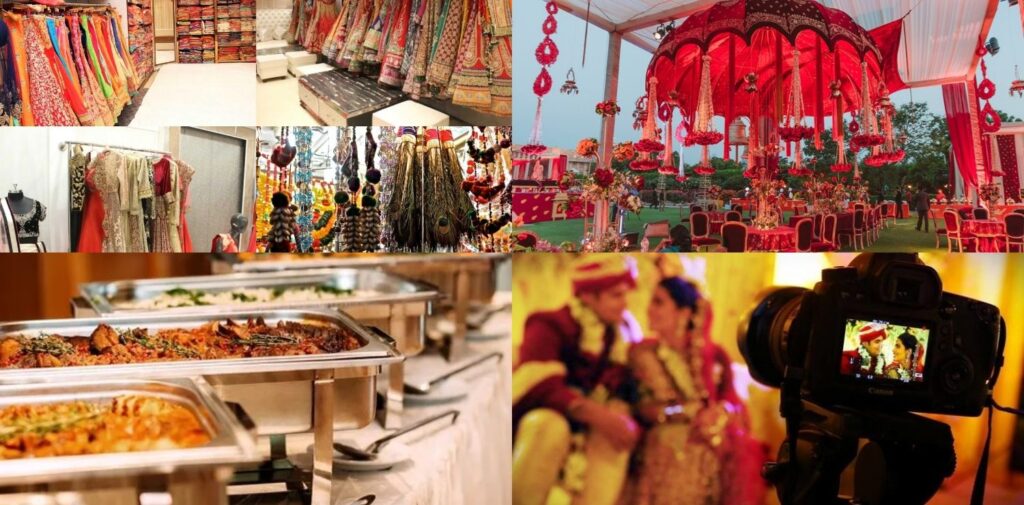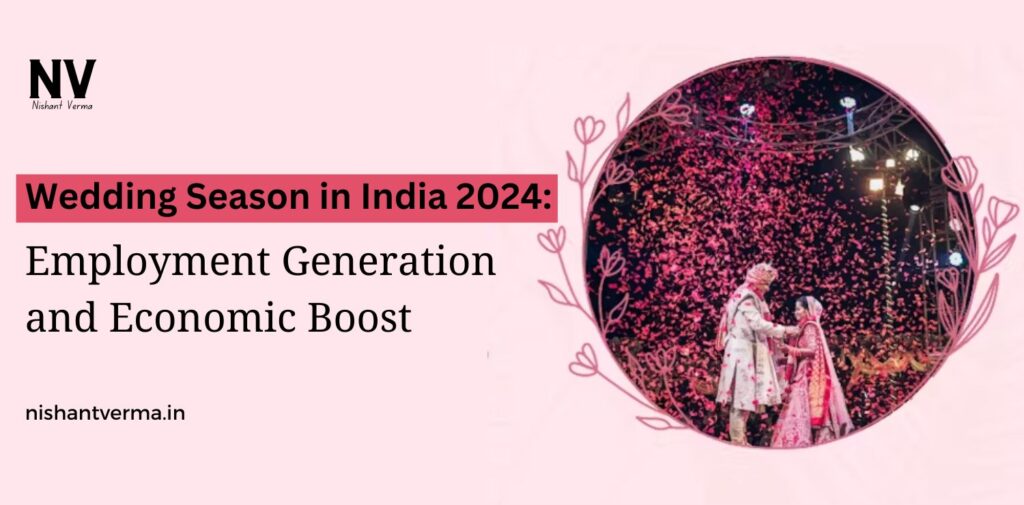India, with its rich cultural diversity, celebrates weddings grandly. The wedding season is a time of joy and celebration for families, but it is also a period that has a significant impact on the country’s economy. The year 2024 is no different, with over 48 lakh weddings expected to take place, generating enormous economic activity. From small vendors and retailers to large wedding planners and service providers, the wedding season provides employment and sustains a variety of industries.
In this article, we will explore how the wedding season in India is expected to generate employment, support small businesses, and provide a substantial boost to the Indian economy. Let’s take a closer look at the scale of this event and its far-reaching impact.
The Scale of the Indian Wedding Season
Weddings in India are not just an event; they are an extravaganza. The wedding season is marked by lavish ceremonies, elaborate rituals, and a variety of social functions. According to estimates, India is expected to host 48 lakh weddings this year, with an estimated business generation of over Rs 6 trillion. This highlights the scale and importance of weddings in India as a key driver of economic activity.
The wedding season typically peaks during auspicious times like the month of November, when the Dev Uthani Ekadashi festival brings together thousands of weddings. This period is marked by heavy spending across various sectors, which supports numerous small businesses and creates a ripple effect throughout the economy.

Employment Generation During Wedding Season
One of the most significant impacts of the wedding season is the employment it generates. Across the country, weddings create a demand for various services, which leads to the creation of numerous job opportunities. These job opportunities span across several sectors, including:
1. Retail Sector and Wedding Markets: Weddings drive the demand for products, from clothing to jewellery, and everything in between. Retailers and small shop owners experience a significant surge in customers during the wedding season. Bridal shops, garment retailers, jewellery stores, and accessory vendors are especially busy. These businesses often hire additional staff to cope with the high demand, generating jobs for salespeople, cashiers, delivery personnel, and designers.
- Jewellery Retailers: In cities like Delhi, Mumbai, and Jaipur, jewellery stores see a rise in business during the wedding season. Wedding jewellery, including gold, diamond, and imitation jewellery, has a massive demand. These shops hire more workers to manage sales, create custom pieces, and handle customer inquiries.
- Clothing Retailers: The demand for bridal wear, traditional outfits, and formal clothing skyrockets, leading to employment generation for tailors, designers, and shop assistants. Local markets and boutique stores see increased footfall during this time, contributing to employment in small businesses.
2. Event Management and Wedding Planners: The wedding planning industry in India is a multi-billion-dollar sector, with many people relying on professional wedding planners and event management companies. These companies need to hire temporary staff to handle various aspects of the wedding, including decoration, logistics, catering, and guest coordination. Event planners often outsource tasks like flower arrangements, lighting, and sound systems, thereby creating additional employment for workers in these fields.
3. Catering and Food Services: Food is an essential part of Indian weddings, and catering services are in high demand. Wedding caterers need staff for cooking, serving, cleaning, and managing the logistics of catering large events. In addition, local food vendors, such as sweet shops and snack stalls, also benefit from the increased demand during the wedding season, providing temporary jobs for workers across the hospitality sector.
4. Transportation and Logistics: With families and guests travelling to different locations, the demand for transportation services spikes. From taxis to buses, from car rentals to luxury buses, transportation companies hire additional drivers, coordinators, and support staff. Delivery services for wedding gifts, flowers, and wedding attire also require temporary workers, creating further employment opportunities.
5. Photographers, Videographers, and Artists: No Indian wedding is complete without a photographer and videographer to capture the memories. This has created a booming industry for photographers, videographers, and even makeup artists. During wedding season, they are in high demand, often working long hours to meet the needs of various weddings. Additionally, musicians and performers, including DJs and folk singers, also benefit from the wedding rush, generating employment in the entertainment sector.
6. Wedding Vendors and Service Providers: Vendors who provide specialized services, such as florists, mehendi artists, and bridal makeup artists, also see a surge in business. These small businesses require additional labour during wedding season, creating job opportunities for artisans, stylists, and assistants.

Boost to the Economy
The wedding season’s impact on the Indian economy is substantial, particularly for small vendors and retailers. The wedding industry in India contributes massively to GDP, with estimates suggesting it generates over Rs 6 lakh crore in business during the peak wedding season. This translates into a significant economic boost, especially in sectors like retail, hospitality, transportation, and tourism.
- Economic Activity in Tier 2 and Tier 3 Cities: The wedding season has a more extensive reach than just the major cities. In smaller towns and rural areas, weddings can be a primary source of economic activity. Small retailers, local caterers, and event managers benefit from the boom in demand. This demand also helps create employment opportunities for people in rural areas, reducing migration to cities and improving local economies.
- Tourism Boost: Many weddings are hosted at luxury hotels, resorts, and even heritage sites, boosting the tourism sector. This trend has been growing over the years, as destination weddings gain popularity. As a result, the tourism and hospitality industries experience a surge in bookings, creating jobs in hotels, restaurants, and related services.
- Increase in Spending: The wedding season triggers a ripple effect across the economy. Families spend on venues, clothes, food, jewellery, and gifts, which support numerous industries. This massive outflow of money not only benefits the service providers but also supports the retail sector, manufacturing (particularly for wedding-related products), and even the agricultural sector (through increased demand for flowers and produce used for rituals).
- Boost to the Real Estate Sector: Real estate is also indirectly impacted by the wedding season. Many families opt to host weddings in lavish venues, sometimes even booking large halls, resorts, or hotels for days. This surge in demand for wedding venues can lead to an increase in the construction of banquet halls, wedding resorts, and luxury hotels, further supporting the real estate sector and creating more jobs.

The Role of Technology in the Wedding Industry
In recent years, technology has played an increasingly important role in the wedding industry. Platforms offering wedding-related services such as venue booking, vendor management, and even online wedding planning tools have grown in popularity. This has also generated employment in the technology and startup sectors, with job roles in app development, marketing, and customer service becoming more prominent during the wedding season.
Conclusion: Wedding Season in India
In conclusion, the wedding season in India in 2024 is not only a time of celebration but also a significant driver of economic activity. It generates employment for millions of people, from small vendors and retailers to large-scale event organizers and service providers. The wedding industry plays an important role in supporting the economy, particularly in terms of boosting retail, hospitality, transportation, and other sectors.
As weddings are expected to generate over Rs 6 trillion in business, it’s clear that the wedding season in India has a far-reaching impact, not only on individuals and families but also on the overall economic landscape. By supporting local businesses, creating jobs, and generating substantial revenue, the wedding season remains an essential part of India’s economic engine.




